#Claire Atherton
Photo
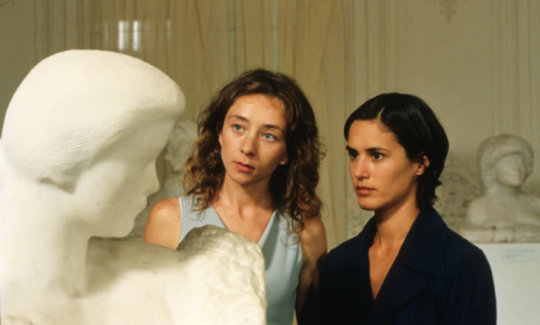
I prefer the truth even if it hurts. Yet all you give me are half-truths when you know I'll find out anyway.
La captive, Chantal Akerman (2000)
#Chantal Akerman#Eric De Kuyper#Stanislas Merhar#Sylvie Testud#Olivia Bonamy#Liliane Rovère#Françoise Bertin#Aurore Clément#Vanessa Larré#Samuel Tasinaje#Anna Mouglalis#Bérénice Bejo#Adeline Chaudron#Sabine Lancelin#Claire Atherton#2000#woman director
63 notes
·
View notes
Text
Almayer's Folly (2011)
Almayer's Folly by #ChantalAkerman, "If only the film was as commanding as it is stunning in its pictorial magnificence",
CHANTAL AKERMAN
Bil’s rating (out of 5): BB.5
Original Title: La folie Almayer
Belgium/France, 2011. Centre du Cinéma et de l’Audiovisuel de la Fédération Wallonie-Bruxelles, Artemis Productions, Belgacom, Canal+, Centre National du Cinema et de L’Image Animee, Cine+, Liaison Cinématographique, Paradise Film, Radio Television Belge Francophone, Tax Shelter Film Funding, Tax Shelter du…
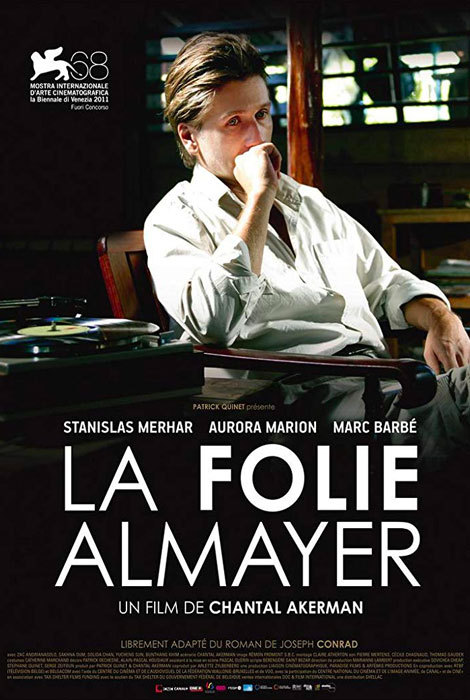
View On WordPress
#Alain-Pascal Housiaux#Artemis Productions#Aurora Marion#Belgacom#Belgium#Bunthang Khim#Canal+#Catherine Marchand#Centre du Cinéma et de l&039;Audiovisuel de la Fédération Wallonie-Bruxelles#Centre National du Cinema et de L&039;Image Animee#Chantal Akerman#Cine+#Claire Atherton#France#Henry Bean#Joseph Conrad#Liaison Cinématographique#Marc Barbé#Nicole Brenez#Paradise Film#Patrick Dechesne#Patrick Quinet#Radio Television Belge Francophone#Rémon Fromont#Sakhna Oum#Solida Chan#Stanislas Merhar#Tax Shelter du Gouvernement Fédéral Belge#Tax Shelter Film Funding#TIFF 2011
0 notes
Text

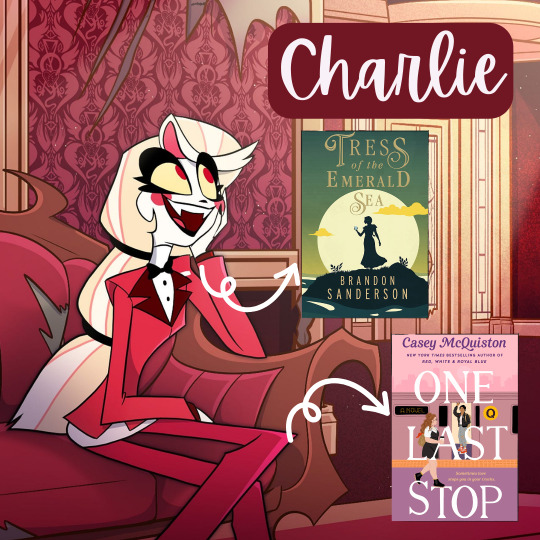
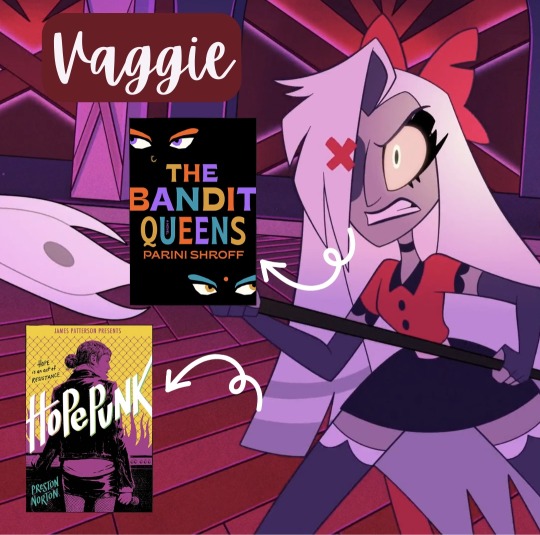
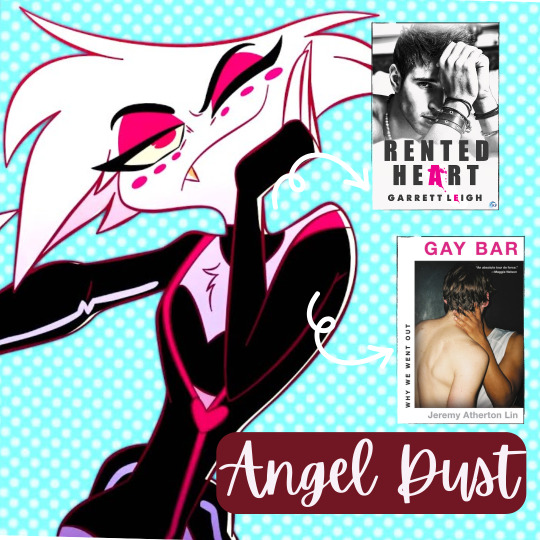


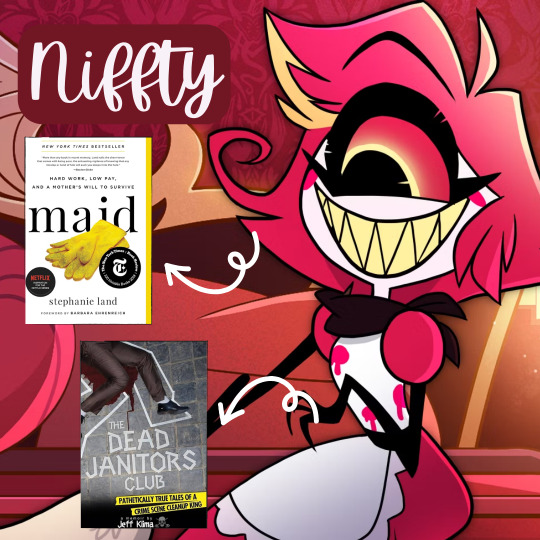



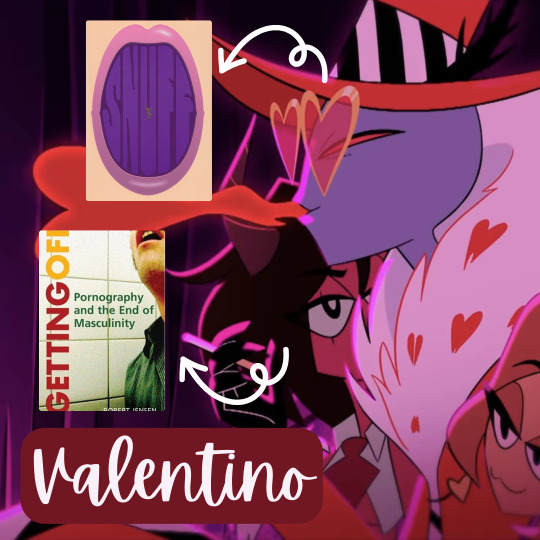

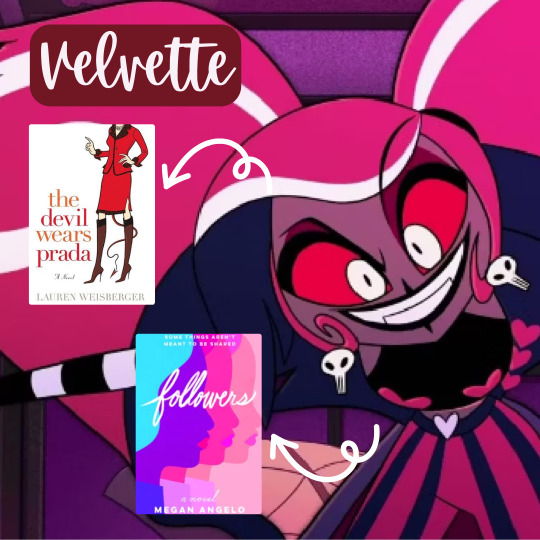
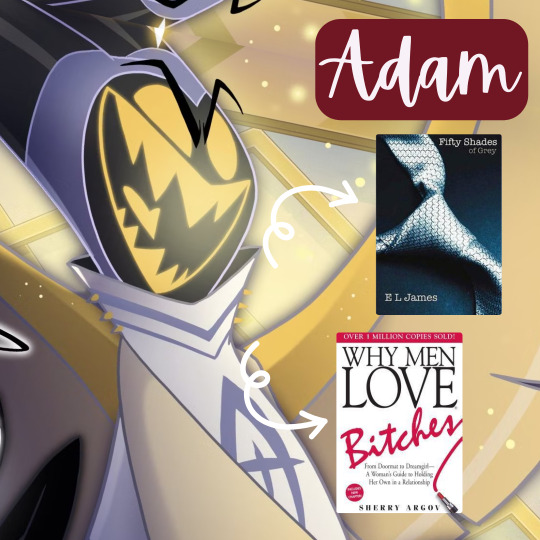
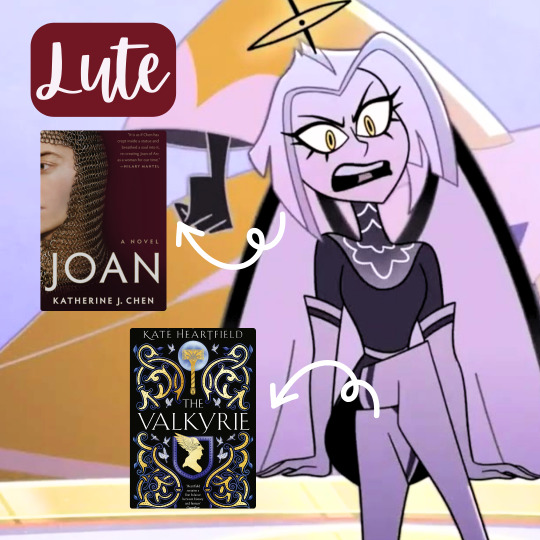
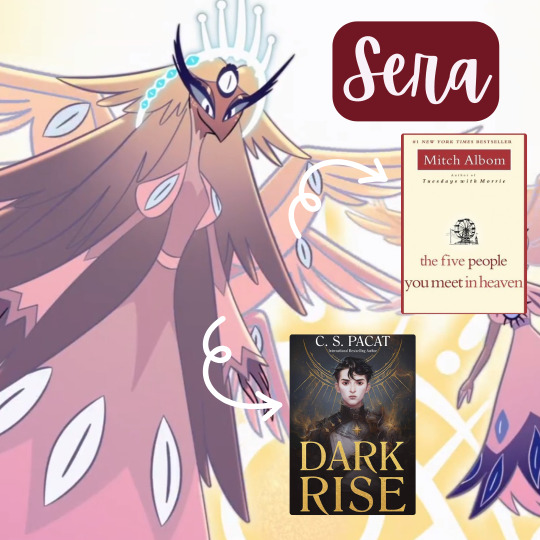
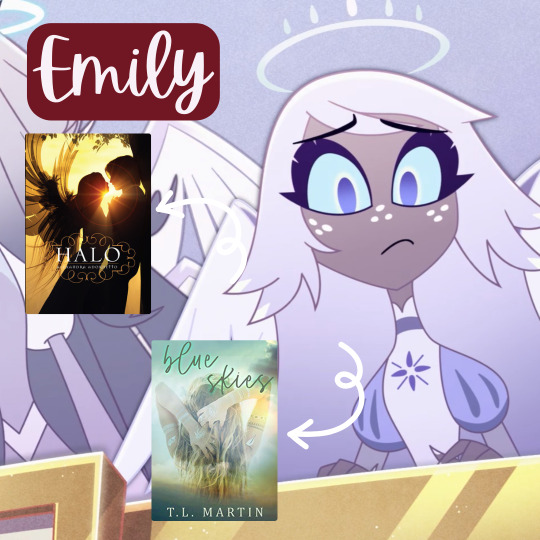

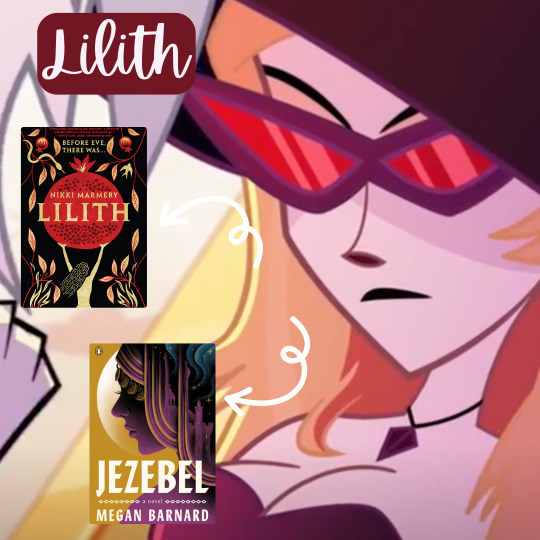
😈📚 characters from hazbin hotel as books 📚😈
i finally got around to posting all of these on my bookstagram, and i figured i'd post them here too! putting this together was so much fun that i just had to share. full book list below the cut!
👑 Charlie:
- Tress of the Emerald Sea by Brandon Sanderson
- One Last Stop by Casey McQuiston
✖️ Vaggie:
- The Bandit Queens by Parini Shroff
- Hopepunk by Preston Norton
🎥 Angel Dust:
- Rented Heart by Garrett Leigh
- Gay Bar: Why We Went Out by Jeremy Atherton Lin
♣️ Husk:
- The Lost Weekend by Charles Jackson
- The Gambler by Fyodor Dostoevsky
📻 Alastor:
- A Certain Hunger by Chelsea G. Summers
- Lost Signals by Max Booth III
🧹 Niffty:
- Maid by Stephanie Land
- The Dead Janitor's Club by Jeff Klima
🍎 Lucifer:
- Angels Before Man by rafael nicolás
- Dayspring by Anthony Oliveria
🐍 Sir Pentious:
- Soulless by Gail Carriger
- Boneshaker by Cherie Priest
💣 Cherri Bomb:
- Girls to the Front by Sara Marcus
- We Sold Our Souls by Grady Hendrix
🚬 Valentino:
- Snuff by Chuck Palahniuk
- Getting Off: Pornography and the End of Masculinity by Robert Jensen
📺 Vox:
- Universal Harvester by John Darnielle
- White Noise by Don DeLillo
📱 Velvette:
- The Devil Wears Prada by Lauren Weisberger
- Followers by Megan Angelo
🎸 Adam:
- Fifty Shades of Grey by E.L. James
- Why Men Love Bitches by Sherry Argov
🗡️ Lute:
- Joan by Katherine J. Chen
- The Valkyrie by Kate Heartfield
😇 Sera:
- The Five People You Meet in Heaven by Mitch Albom
- Dark Rise by C.S. Pacat
👼 Emily:
- Halo by Alexandra Adornetto
- Blue Skies by T.L. Martin
🥀 Rosie:
- In the Garden of Spite by Camilla Bruce
- Woman Eating by Claire Kohda
👸 Lilith:
- Lilith by Eve Marmery
- Jezebel by Megan Barnard
#hazbin hotel#charlie morningstar#lucifer morningstar#vaggie#chaggie#angel dust#husk#huskerdust#alastor#radiodust#radiostatic#niffty#sir pentious#cherri bomb#valentino#vox#velvette#the vees#lute#adam#sera#emily#rosie#lilith morningstar#appleradio#radioapple#cherrisnake#helluva boss#hellaverse#books
462 notes
·
View notes
Text
May 2023 Reads

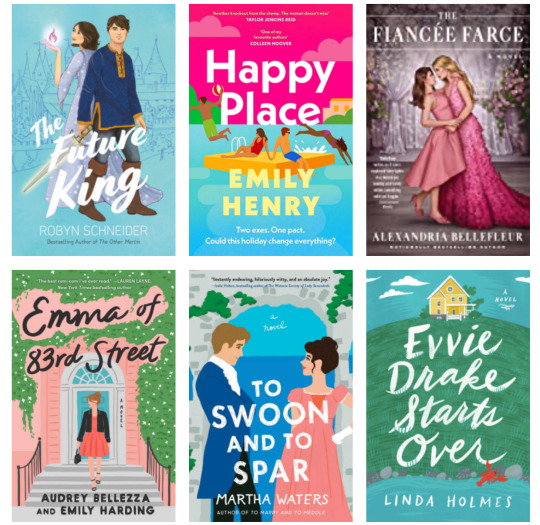


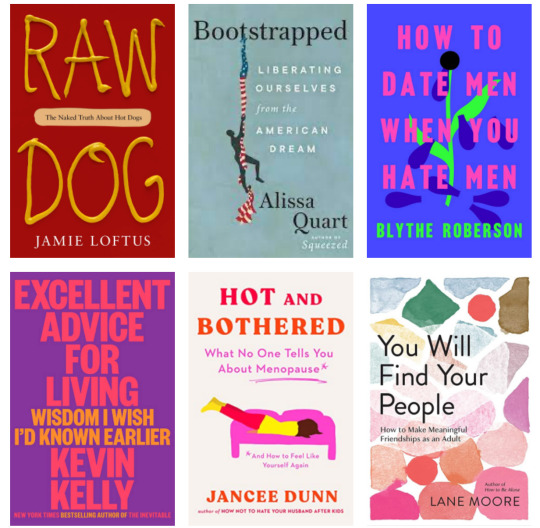
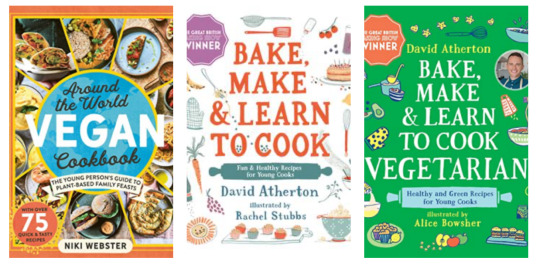

Thief! - Megan Whalen Turner
The King of Attolia - Megan Whalen Turner
A Conspiracy of Kings - Megan Whalen Turner
Thick As Thieves - Megan Whalen Turner
Painted Devils - Margaret Owen
The Other Merlin - Robyn Schneider
The Future King - Robyn Schneider
Happy Place - Emily Henry
The Fiancee Farce - Alexandria Bellefleur
Emma of 83rd Street - Audrey Bellezza & Emily Harding
To Swoon and to Spar - Martha Waters
Evvie Drake Starts Over - Linda Holmes
Summer Reading - Jenn McKinlay
The Boyfriend Candidate - Ashley Winstead
Imogen, Obviously - Becky Albertalli
Lying in the Deep - Diana Urban
This Book is My Best Friend - Robin Robinson
Quietly Hostile - Samantha Irby
Broken Horses - Brandi Carlile
Honey, Baby, Mine - Laura Darn & Diane Ladd
Live Wire - Kelly Ripa
Beautiful Trauma - Rebecca Fogg
Monsters - Claire Dederer
Bird by Bird - Anne Lamott
Raw Dog - Jamie Loftus
Bootstrapped - Alissa Quart
How to Date Men When You Hate Men - Blythe Roberson
Excellent Advice for Living - Kevin Kelly
Hot and Bothered - Jancee Dunn
You Will Find Your People - Lane Moore
Betting on You - Laurie Ruettimann
I Saw You... - Julia Wertz
How to Die Alone - Mo Welch
CraftFail - Heather Mann
Random Illustrated Facts - Mike Lowery
This Book is For You - Worry Lines
Around the World Vegan Cookbook - Niki Webster
Bake, Make, and Learn to Cook - David Atherton
Bake, Make, and Learn to Cook Vegetarian - David Atherton
Bold = Highly Recommend
Italics = Worth It
Crossed out = Nope
Thoughts:
This month continued my Queen’s Thief obsession. Highly recommend this series - each book goes in a new and exciting direction.
Also, Happy Place broke me and then built me up again. Painted Devils did not disappoint, and the Emry Merlin series was a nice surprise.
Goodreads Goal: 174/400
2017 Reads | 2018 Reads | 2019 Reads | 2020 Reads | 2021 Reads|
2022 Reads | 2023 Reads
58 notes
·
View notes
Text
10 minute read
In early January 2012, Karen Ingala Smith was at the airport returning from holiday when she took a call from a colleague. She heard that a desperate young woman who’d sought help from Nia, the women’s refuge charity Ingala Smith runs, had just been murdered. Once back home, Ingala Smith opened her laptop to find out more.
Searching Google for “woman’s body found”, she soon discovered Nia’s client Kirsty Treloar, 20, the mother of a month-old baby who’d been abducted from her family home in Hackney, east London, by her boyfriend, Myles Williams, from whom she’d recently fled. Stabbing Kirsty’s brother and sister as they tried to stop him, Williams bundled her into his car. Later her body was found two miles away, dumped behind a wheelie bin, with 29 knife wounds.
But this online search yielded other results, so Ingala Smith read on. That same day in Co Durham, Susan McGoldrick, along with her sister Alison Turnbull and niece Tanya, were shot dead by her partner, Michael Atherton. Meanwhile in Nuneaton, nightclub bouncer Aaron Mann had beaten his girlfriend, Claire O’Connor, then smothered her with a pillow. The next day in Shropshire, a retired teacher, Betty Yates, 77, was beaten with her walking stick and stabbed to death by a drifter, Stephen Farrow. On January 3 in Buckinghamshire, Marie McGrory was strangled with a dog lead by her husband, John; in South Lanarkshire Kathleen Milward, 87, was bludgeoned to death by her grandson, Garry Kane.
Through her work, Ingala Smith was grimly familiar with such killings. But this deluge of cases appalled her. Eight British women had been murdered by men – all except one a partner or family member – in the first week of 2012. Each brutal murder, illustrated with a smiling holiday snap, was reported as neutrally as the weather: men killing their womenfolk was “just one of those things”.
“Perhaps because it was the start of the year,” says Ingala Smith. “I made a list of the names, as that’s the easiest way to tell one case from another. And then I never stopped.”
She began trawling local newspaper and police websites, creating an ExCel spreadsheet which she’d update as cases came to court.
It was an upsetting task, which Ingala Smith learnt to avoid just before bedtime. Her data collection method was crude but, until this year, the Office for National Statistics (ONS) only published figures for the sex of victims, not their killers, making female victims of male violence hard to quantify. As her list lengthened Ingala Smith created a Counting Dead Women Twitter account, posting each killing. This attracted public attention and a philanthropist who awarded her a grant to hire part-time staff. Now she could analyse murder trends and since 2015 has published the Femicide Census.
But what mattered most to Ingala Smith were women’s names, not numbers. So in 2016 she was delighted when the Labour MP Jess Phillips – who’d previously worked for Women’s Aid – asked to read them out on International Women’s Day. Now this roll call of more than 120 stolen lives, recited to a hushed House of Commons, has become an annual commemoration. “Dead women is a thing we’ve all just accepted as part of our daily lives,” Phillips said last year, when among the names was Sarah Everard. The list not only put male violence in the national spotlight but, says Ingala Smith, “Family after family have said how important it is to hear their loved one’s name read out in parliament, and know it is recorded in Hansard for ever.”
Now Ingala Smith, 54, has written a book, Defending Women’s Spaces, drawing upon more than 30 years of working with vulnerable women who are homeless or fleeing domestic abuse. After witnessing the power of female-only services she is alarmed by moves to make “gender identity” rather than sex the criteria for admission to refuges and rape survivor groups. She points out that 98 per cent of rapes and 90 per cent of violent crime is committed by males. While “What is a woman?” has become a question politicians struggle to answer, Ingala Smith is categoric. “Allowing biological males with transgender identities to access women’s spaces,” she writes, “poses a serious potential risk to women’s safety, wellbeing and recovery.”
Ingala Smith grew up in a home that was far from harmonious: anger and upset were never far away. The man she called Dad was a builder, providing what she describes as “a comfortable working-class home” in Huddersfield, West Yorkshire. But, she says, he was a controlling man: “It felt the whole family, especially my mum, was always walking on eggshells.”
Eventually, when Ingala Smith was 18, her mother left and confided in a friend that Karen had a different father. In fact, she was the product of a fling at 18 with her fiancé’s best man, a Sicilian who’d moved to Yorkshire to marry a local girl he’d met in Milan. While Ingala Smith’s brother and sister were blond, she was dark and, as she grew older, her mother secretly removed photos from the wedding album in case she noticed how similar she looked to a certain guest.
When Ingala Smith heard about her real father she made contact. At 21 she met him at Thornton railway station, near Bradford. “I was looking for this gorgeous Italian man,” she says. “I’m thinking Robert De Niro, Al Pacino – and actually I got Danny DeVito.” She laughs. They hit it off straight away and she was quickly welcomed into his family, later meeting her Sicilian grandparents.
A bright girl, Ingala Smith found school a sanctuary from her troubled home life. There were few books in her house and she’d never considered A-levels let alone college, “but I happened to have a good friend from what you might call a first generation middle-class family. I remember having my mind blown that they had political conversations around the dinner table, because we weren’t allowed to speak when we were eating.”
Studying sociology at sixth-form college was “absolutely life-changing – it put everything I was experiencing into context”. It was here she first encountered feminism, which she regarded then as irrelevant, feeling more in common with the lads from her old comprehensive than the “posh girls” now in her class who’d been at a fee-paying school.
After graduating from the University of Kent, she took a job in a hostel for homeless women, mainly elderly former psychiatric patients. Then, after two years, she began work at a domestic violence refuge and felt immediately she was in the right place. “Any woman I met could have been my mother. In fact, one summer Mum came on a trip we organised for the refuge kids and she started talking about how there hadn’t been anything like this when she’d needed it.”
Would her mother have left for a refuge? Ingala Smith shrugs. “I don’t know. They are not easy places to live in. We had a nice home and to give that up would be really hard, as it is for anyone.” She says people rarely understand refuges are places of absolute last resort. “They can be chaotic, noisy. Women who have other economic choices would go elsewhere. You’re moving into a house with maybe ten other families that you don’t know, with children of all different ages, with very different parenting ideas to your own. They can really help kids who’ve grown up with violent dads because they meet others in the same boat. But they’re challenging places.”
A move to a refuge is invariably fast. A woman in danger is referred by police or social services, then refuge staff have a brief phone call to try to determine whether she’s a danger to others – perhaps has a history of violence or arson – before arranging to meet her close by. (A refuge never gives out its address on the phone.) “You’d imagine women would turn up black and blue, but that is rare,” Ingala Smith says. “I think women wait until they’re ‘decent’. Besides, after an assault they often don’t have the strength to get themselves together. They wait until it’s quieter, when they know it’s coming again, and then leave.”
The refuge suggests a safety plan: to gather up passports and bank books; siphon possessions discreetly to a friend’s house; to remember that you’re most at risk of violence just after leaving. Ingala Smith notes there were few referrals in late December. “Women didn’t want to leave violent men and disrupt Christmas for children, and you knew anybody who came at that time of year – one year we had a woman turn up on Christmas Eve with three kids – was in a really bad way. In January, the phone rings off the hook.”
Ingala Smith has been the CEO of Nia since 2009. Beginning as Hackney Women’s Aid in 1975, it supports about 2,000 women a year, running a specialist refuge for women in prostitution and another for those dealing with substance abuse. Much has changed since she joined the refuge movement: many small feminist charities have merged as they must now compete for council contracts with generic housing trusts. These don’t provide the “woman-centred care” Ingala Smith believes is vital for those fleeing violent men.
Nia also works with women at high risk of domestic violence and runs East London Rape Crisis, serving both sexes. Here it counsels men and trans women, whom it often refers to Galop, a specialist LGBT+ anti-abuse charity. But no male people – whether men or trans women – are allowed into Nia refuges or group counselling.
In 2017, Nia’s trustees decided to invoke the exemptions in the Equality Act that permit single-sex services “as a proportionate means of achieving a legitimate aim”. It knew this was a risk. Such is the toxic debate on gender, female-only services often receive threats to their funding or have staff reported to trustees merely for liking a JK Rowling tweet. They receive hoax calls to test whether they are trans inclusive. The whole sector is chilled by how trans activists targeted Vancouver Rape Relief and Women’s Shelter: it was defunded, vandalised and had a dead rat pinned to its door for remaining single sex.
The question of whether a trans woman can safely be accommodated alongside women has riven the refuge movement. “They [trans women] are not a potential risk to women because they are trans,” she writes, “but because they are male.” She cites cases of trans prisoners like Karen White who were allowed into female jails and sexually abused inmates. “Prison officers, who are really good at risk-assessing violent men, get it wrong. So how can we screen [people] in five-minute phone calls?”
Besides, this is about more than safety. Many women in refuges endured sexual abuse, often as children. Being housed with any males generates a debilitating and involuntary post-traumatic response in the brain. “It’s not hate. It’s not bigotry. It’s not transphobia,” she says. “It is an impact of abuse by men… The presence of a male-bodied person among vulnerable women causes distress and consternation.” She is aghast that Mridul Wadhwa, the trans woman who heads Edinburgh Rape Crisis, told The Guilty Feminist podcast last year that female survivors who demand male-free spaces should work to “reframe their trauma”.
In group counselling, she says, male people have been socialised to dominate groups, to ask more questions and take up space, while women have learnt to serve and make way for them. “I remember talking to a woman about what her options were and she started crying. I asked why. She said, ‘Nobody’s ever given me a choice before.’ To recover, women have to centre themselves in their own lives.”
But what of women who say they have no problem receiving counselling alongside trans women? “I understand that some female rape survivors can say, ‘A women-only service is not important to me. I’d be happy for a trans sister to be in my group.’ If they want to say that, it’s fine, but they shouldn’t take away that choice from women for whom it isn’t fine.” Young women who campaign for trans-inclusive services, she says, are mainly middle-class graduates unlikely to need them. Nia’s younger staff support the policy, even though defending it has cost some of them friends.
At root, Ingala Smith believes, violence suffered by women and trans women has a different dynamic. In her book she disputes Stonewall’s assertion that trans women suffer the highest levels of domestic abuse and murder. “Well, show me the data. Because I hear that, but I’ve never seen figures to demonstrate it.” She has collated every murder victim who might come under the broad Stonewall definition of a trans woman (which includes occasional cross-dressers). Since 2009, there have been nine murders, the last being Amy Griffiths in 2019. Most were sex workers murdered by punters or who died in drug-related fights. Just one, Vanessa Santillan in 2015, was killed by an intimate partner.
By contrast, only about 8 per cent of women victims are killed by strangers, the rest by men they know. “Most women’s refuges work exclusively with women who are fleeing partners, former partners and, in some cases, family members,” she writes. “That doesn’t mean other people don’t need places of safety or support, just that their experiences and needs are different.” She wonders why Stonewall doesn’t devote its resources to setting up specialist services rather than campaigning against those created by and for women.
The Femicide Census has revealed trends Ingala Smith hadn’t anticipated. “I was shocked,” she says, “by the number of elderly women killed in burglaries. I assumed that if a man broke into an old woman’s house he might push her down the stairs, she could be frail and bang her head. But there’s a real brutality, a particular anger and misogyny involved. Often young men use sexual violence against elderly women.” She was also surprised how many women are killed by their own sons.
Twice as many men are murdered than women but overwhelmingly by other men. When women kill – 8 per cent of murderers are female – they are both more likely to use a weapon (which makes it an aggravated offence in sentencing) and to have been abused by their victim, while men, being stronger, frequently kill with their bare hands. Strangulation is men’s second most common murder method and lately Ingala Smith has seen many lawyers adopt the “sex game gone wrong” defence.
How has devoting her life to the terrible things men do to women affected her own life? “I had a string of disastrous relationships – I just shagged around, basically – and didn’t think men were up to much.” She’d find herself moved to tears when witnessing a happy family, since her own experience was so dysfunctional.
Then, after writing off men as “avenues for happiness”, she decided to apply herself properly rather than settling for “whoever I ended up snogging in a pub at the weekend”. She started internet dating, setting herself high standards. The result was her husband of 20 years, André, a subtitler of South African parentage who speaks four languages, to whom she dedicates her book. They have no children, after several painful failed courses of IVF.
Ingala Smith knows her book will put her further in the firing line – the Labour Party has already refused her application for membership – but single-sex services “are the hill I’m prepared to die on”. That list of dead women never gets any shorter, I say. Will there ever be fewer names? “That’s the subject of my PhD, which I’m just finishing,” she says, “and my next book.”
Defending Women’s Spaces by Karen Ingala Smith is out now (£15.99, Polity)
112 notes
·
View notes
Note
Are there, by chance, voice files of the female deputy actually speaking, or a name of the voice actor who recorded the sound effects?
The female Deputy never speaks, but it sounds to me like she has the same voice actor as one of the cultists. You can find a transcript of most of her lines in this document if you search for “CULT_FOLLOWER_FEMALE_05”. One of the Angels might be played by the same person too.
I know Randy Yuen did motion capture for the Deputy in general, and maybe the male Deputy has his voice, but there is no information about who played “CULT_FOLLOWER_FEMALE_05” and the female Deputy…
The actor’s name must be in the credits, however, so probably one of these people:
VOICE TALENT
Doug Abrahams
Marty Adams
Claire Armstrong
Ted Atherton
Kailea Banka
Carolina Bartczak
Lawrence Bayne
Bruce Blain
Jesse Bond
Sarah Booth
Marc-André Boulanger
Wyatt Bowen
Paul Braunstein
Kimberly D. Brooks
Jason Bryden
Nicki Burke
Mark Camacho
Braeden Clarke
Lucinda Davis
Stacey DePass
Bruce Edwards
Jake Epstein
Jonathan Goad
Amber Goldfarb
Alain Goulem
Rob Greenway
Gavin Hammon
Ian Hanlin
Lauren Jackson
Julianne Jain
Mara Junot
Helen King
Jameson Kraemer
Gabe Kunda
Tristan D. Lalla
Erica Lindbeck
Erin Mathews
James Mathis III
Jon McLaren
Scott McNeil
Cynthia Kaye McWilliams
Chimwemwe Miller
Julie Nathanson
Mayko Nguyen
Peter Outerbridge
Lindsay Owen-Pierre
Giles Panton
Christopher Parson
Kristen Peace
Murry Peeters
Simon Lee Phillips
Geoffrey Pounsett
Claire Rankin
David Richmond-Peck
Cara Ricketts
Kyle Rideout
Charlotte Rogers
Paula Shaw
Jesse Sherman
Ivan Sherry
Howard Siegel
Jonathan Silver
Dylan Taylor
Jeff Teravainen
Brett Watson
Jane Wheeler
Dan White
Scott Whyte
Debra Wilson
Kim Yarbrough
Farid Yazdani
And there is a little more information about who played who on IMDb.
This is all I know for the moment... but I hope it helps :)
14 notes
·
View notes
Note
It looks like they recast Jenny with Kristin Atherton. Was wondering if you have seen her in anything? Nothing negative here, just new Laura Donnelly wouldn't be back. Thanks for your blog. Be well🙏🧡
I haven't seen any shows with Kristin Atherton. She seems to have been in Doctors and Waterloo, and I see some more in IMDb
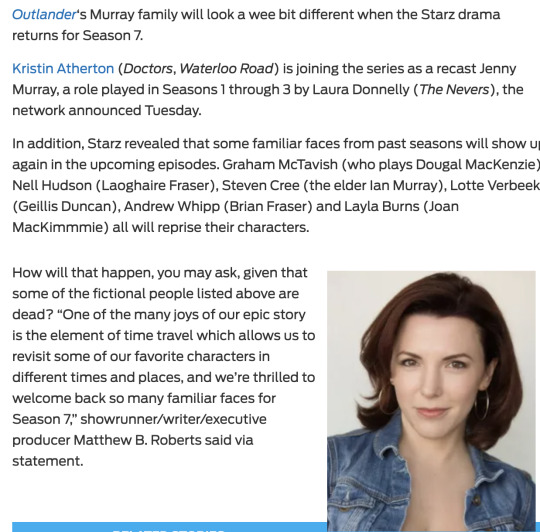

We all knew Laura Donelly wouldn't be back, big shoes to fill. But most of the time the casting of OL is good (just SS totally not - cough cough)
Anyway, we'll probably get to see it...
People wondering why the other (dead) characters like Brian, Dougal and Geilis will be back. See my other post yesterday (it does contain spoilers though.... but then you'll know). In short, they'll (not Jamie and Claire, but Roger) be back in 1739 at some point... so the years included so far in S7 are 1776-1779, 1980 and 1739
19 notes
·
View notes
Text
Fundie Families and Adjacents I Follow: Spivey
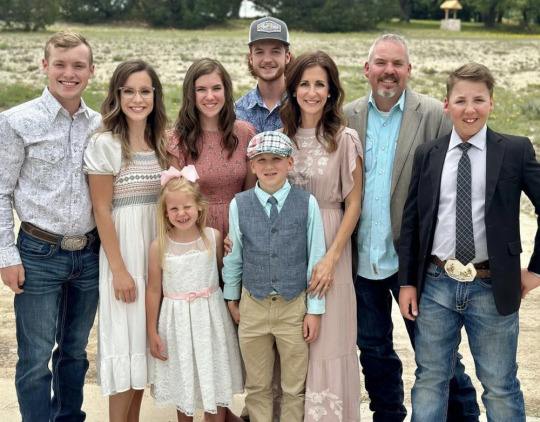
Robert Tarver Spivey Jr. "Rob"- September 30, 1973
Hilary Yvonne Atherton- March 19, 1978
They married on September 18, 1999, at ages 25 and 21. They share 6 children and a son-in-law.
Claire Yvonne- February 27, 2001
Robert Tarver Spivey III "Robby"- November 20, 2003
Paige Ann- June 29, 2006
Wyatt Slade- September 5, 2010
Taylor Marvin- November 11, 2012
Carson Lynn- June 22, 2016
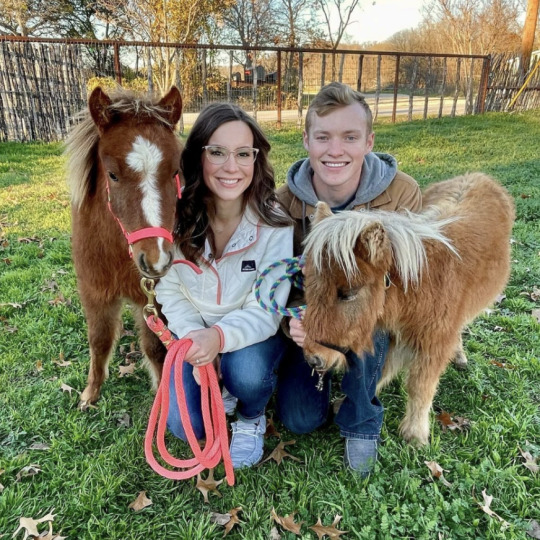
Claire married Justin Samuel Duggar (November 15, 2002) on February 26, 2021, at ages 19 and 18.
5 notes
·
View notes
Text
Literally just a list of every book I've read this year, ranked.
A Heart That Works - Rob Delaney
Written in Bone - Sue Black
Our Wives Under the Sea - Julia Armfield
The Memory of Animals - Claire Fuller
A Marvellous Light - Freya Marske
The Cockroach - Ian McEwan
Why I'm No Longer Talking To White People About Race - Reni Eddo-Lodge
Notes on an Execution - Danya Kukafa
War Doctor: Surgery on the Front Line - David Nott
It's OK to Be Angry About Capitalism - Bernie Sanders
Taste - Stanley Tucci
Glutton: The Multi-Course Life of a Very Greedy Boy - Ed Gamble
Strong Female Character - Fern Brady
Uncomfortable Conversations With a Black Man - Emmanuel Acho
The Nickel Boys - Colson Whitehead
Sidesplitter - Phil Wang
LOTE - Shola von Reinhold
Vladimir - Julia May Jonas
Lessons in Chemistry - Bonnie Garmus
Patricia Wants to Cuddle - Samantha Allen
Climate Change is Racist - Jeremy Williams
Chlorine - Jade Song
The Transgender Issue - Shon Faye
Le Consentement - Vanessa Springora
Black Klansman - Ron Stallworth
Pageboy - Elliot Page
The Herd - Andrea Bartz
All That Remains - Sue Black
James Acaster's Guide to Quitting Social Media - James Acaster
What Would the Spice Girls Do? - Lauren Bravo
Educated - Tara Westover
The Frighteners - Peter Laws
Gay Bar: Why We Went Out - Jeremy Atherton-Lin
Fix the Systen, Not the Women - Laura Bates
The History Boys - Alan Bennett
Letters of Note: Love - Shaun Usher
The Metamorphosis - Franz Kafka
What a Shame - Abigail Bergstrom
Burnt Sugar - Avni Doshi
Just by Looking at Him - Ryan O'Connell
Devil House - John Darnielle
Poor - Caleb Femi
The Decagon House Murders - Yukito Ayasuji
I'm Afraid of Men - Vivek Shraya
I'm a Fan - Sheena Patel
The Mad Women's Ball - Victoria Mas
Daisy Chains - Lynne Vande Stouwe
Lemons Lemons Lemons Lemons Lemons - Sam Steiner
Confessions of a Funeral Director - Caleb Wilde
Misfits: A Personal Manifesto - Michaela Coel
Insomnia - Marina Benjamin
My Darling from the Lions - Rachel Long
Bluets - Maggie Nelson
Heatwave - Victor Jestin
1 note
·
View note
Text
Claire Atherton -
Como era trabalhar com Chantal Akerman? [Entrevista]
A montadora Claire Atherton conta ao Mulher no Cinema como era sua colaboração com Chantal Akerman, com quem trabalhou por mais de 30 anos.
A entrevista foi realizada durante a abertura da exposição “Chantal Akerman: Tempo Expandido”, em cartaz no Oi Futuro, no Rio de Janeiro (RJ), até 27/01/2019.

View On WordPress
0 notes
Photo
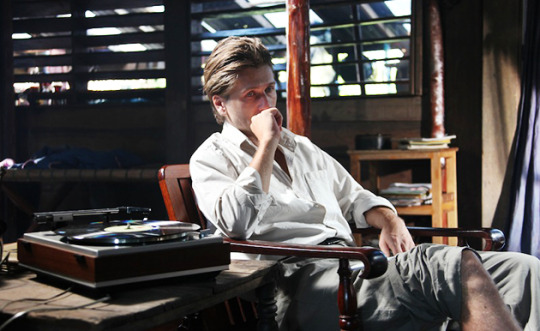
Stanislas Merhar in Almayer's Folly (Chantal Akerman, 2011)
Cast: Stanislas Merhar, Marc Barbé, Aurora Marion, Zac Andrianasolo, Sakhna Oum, Solida Chan. Screenplay: Chantal Akerman, Henry Bean, Nicole Brenez,
based on a novel by Joseph Conrad. Cinematography: Rémon Fromont. Production design: Patrick Dechesne. Film editing: Claire Atherton
Lots of movies -- think of Sunset Blvd. (Billy Wilder, 1950) and Inside Llewyn Davis (Joel Coen and Ethan Coen, 2014), for example -- begin with an incident and then flash back for the rest of the movie to explain it. So Chantal Akerman's Almayer's Folly begins with the camera following a Malaysian man into a nightclub where another man is lip-synching to Dean Martin's version of the song "Sway" as a group of women dances behind him. Suddenly the man who entered the club is on stage stabbing the lip-syncher. The music breaks off and all of the dancers flee the stage except one, who continues to perform the hula-like hand movements as if nothing had happened. We hear a voice call out, "Nina! Nina!" but she continues in her trance-like state for a while until she stops and begins to sing Mozart's setting of "Ave Verum Corpus" as the camera holds on her in closeup. The movie then flashes back to reveal that Nina (Aurora Marion) is the daughter of the European Almayer (Stanislas Merhar) and a Malaysian woman, Zahira (Sakhna Oum). Almayer has come to Malaysia in search of his fortune -- he has heard of a gold mine ripe for the taking. Zahira and Nina live with him in a house by the river until one day his fellow European fortune-hunter, Captain Lingard (Marc Barbé), arrives to take Nina to the city to be educated: Almayer wants her to have the benefits and privileges of a European lady. Though Zahira and Nina flee into the jungle, Almayer and Lingard capture the girl. Nina is intensely unhappy at the school, scorned by the European girls, and when Lingard, who has been paying her tuition for Almayer, dies, she is expelled. She wanders the streets of the unnamed Malaysian city (the movie was actually filmed in Cambodia) and finally returns to Almayer's home. There she's seduced by Daïn (Zac Andrianasolo), a shady young man who is supposedly helping Almayer find his fortune. Almayer recognizes his defeat and allows Nina and Daïn to leave together. Unlike Wilder and the Coens, Akerman doesn't return to the opening scene at the film's end, but instead leaves us with two of her characteristic long takes: The first shows Almayer, Nina, and Daïn arriving at a sandbar where the river meets the sea to await the arrival of the boat that will take the two young people away; the camera lingers in a long shot as the boat arrives and Nina and Daïn swim out to it, then Almayer and his servant, Chen (Solida Chan), push off into the river for their return home. The second long take is a closeup of the haggard, obviously very ill Almayer as he sits brooding in his decaying home, with Chen standing out of focus in the background. At the beginning of this take, Almayer says, "Tomorrow, I would have forgotten," a sentence that he repeats at the end after we watch the sun play across his face -- moving much more swiftly than it would in actuality -- and he talks about how the sun is cold and the river is black. By now, we have realized that the lip-syncher was Daïn and that Chen was his assassin. As for Almayer, we can only assume that he has died. Almayer's Folly, which Akerman loosely adapted from the early Joseph Conrad novel, is clearly a fable about the tragedy of colonialism, but she's not intent on laboring that topic. It's as much an attempt to prod the viewer into contemplating the mystery of character and identity as her more celebrated Jeanne Dielman, 23 Commerce Quay, 1080 Brussels (1975) was, and by using less radical variations on the same techniques -- extended takes, minimized action -- she used in that film. Akerman developed a compelling and identifiable style, but there is a point at which style becomes mannerism. (We all want to be thought "stylish," and none of us want to be thought "mannered.") I think Almayer's Folly nears that point but doesn't fully reach it, largely because of the compelling performance of Merhar as Almayer, and because of Akerman's use of the setting, with the help of Rémon Fromont's cinematography and Claire Atheron's editing. She also makes fine ironic use of the Dean Martin song and the Mozart hymn, as well as the only non-diegetic music in the film, interludes filled with the erotic longing of Wagner's Prelude to Tristan and Isolde.
0 notes
Text
From The East (1993)
From The East by #ChantalAkerman, "clearly means more to her than just the curiosity of visiting foreign lands",
CHANTAL AKERMAN
Bil’s rating (out of 5): BBBB
Original Title: D’Est
Belgium/France/Portugal, 1993. Lieurac Productions, Paradise Films, Radiotelevisão Portuguesa, La Sept-Arte, Centre de l’Audiovisuel à Bruxelles, Radio Television Belge Francophone, Centre du Cinéma et de l’Audiovisuel de la Fédération Wallonie-Bruxelles, Loterie Nationale de Belgique, Fonds Eurimages du Conseil de l’Europe.…

View On WordPress
#Agnès Bruckert#Belgium#Bernard Delville#Centre de l&039;Audiovisuel à Bruxelles#Centre du Cinéma et de l&039;Audiovisuel de la Fédération Wallonie-Bruxelles#Chantal Akerman#Claire Atherton#Fonds Eurimages du Conseil de l&039;Europe#François Le Bayon#France#La Sept-Arte#Lieurac Productions#Loterie Nationale de Belgique#Natalia Chakhovskaia#Paradise Films#Portugal#Radio Television Belge Francophone#Radiotelevisão Portuguesa#Rémon Fromont#TIFF 1993
1 note
·
View note
Text
Authorities confronts criticism over cap on renewables revenues
Picture: Rob Atherton/
Shutterstock
The federal government has denied that the brand new plan it has introduced as a part of its Power Costs Invoice is equal to a windfall tax.
Ministers mentioned a short lived “Price-Plus Income Restrict” in England and Wales could be launched to curb the quantity mills could make.
The trade has raised considerations over the impression of the measure on long-term inexperienced investments, with Tom Glover, RWE UK Nation Chair, saying {that a} cap “is a de-facto ‘windfall tax’ on low carbon mills”.
Claire Mack, Chief Govt of Scottish Renewables, mentioned: “The cap which is recommended as a part of the Power Costs Invoice will act as a 100% windfall tax on renewable mills above a sure as-yet unspecified degree.
“On the similar time, extra oil and fuel earnings have been levied with a surcharge of simply 25% and the funding allowance given to grease and fuel corporations provides an enormous incentive to put money into the power sources that are on the root of the value disaster.”
In an interview with Occasions Radio, Enterprise Secretary Jacob Rees-Mogg mentioned: “I don’t suppose anybody of their proper thoughts would name it a windfall tax.
“The intervention available in the market is finished on the idea of limiting the fuel value, which feeds via to the electrical energy value. This feeds via to contributors inside the market.
“So, if we had capped the wholesale value of fuel relatively than the retail value of fuel, this could have affected the renewable power mills anyway.”
In case you loved this story you possibly can signal as much as our weekly e-mail for Power Dwell Information – and in case you’re eager about listening to extra in regards to the journey to internet zero by 2050, you too can signal as much as the future Web Zero e-newsletter.
Originally published at San Jose News HQ
0 notes
Photo
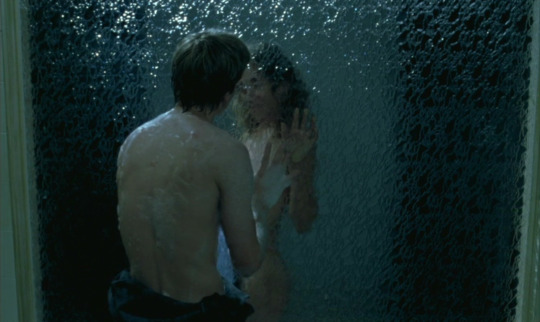
La Captive / Deux amants se quittent, se tutoient, retournent ensemble et le tutoiement reste.
#Cinéma#La Captive#Chantal Akerman#claire atherton#2000#Stanislas Merhar#Sylvie Testud#Olivia Bonamy
9 notes
·
View notes
Quote
Chantal ne me disait jamais ses intentions. En fait, souvent elle ne savait pas à l’avance ce qu’elle allait filmer. Elle n’aimait pas qu’on lui demande ce qu’elle cherche. Elle disait que, si on a trouvé ce qu’on cherche, ce n’est plus la peine de faire un film. Sa façon de faire du cinéma rejoignait mon chemin : laisser les choses venir, respecter le mouvement et ne pas forcer le sens.
https://vacarme.org/article3108.html
2 notes
·
View notes
Quote
The process of editing has to stay mysterious and surprising until the end of the work; it has to stay alive, so that the film stays alive after it’s finished. If you know too well where you want to go, you don’t feel like going anymore. A film that stays alive is a film that is not locked in a particular signification, but which creates different feelings, different meanings, different links for each viewer.
Claire Atherton
3 notes
·
View notes